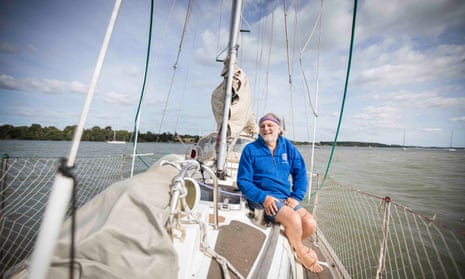Chris Ayres was 66 when he moved aboard his yacht “with a circumnavigation in mind”. He had read about people setting off on adventures. “I thought, let’s try it. I liked the idea that you could just get on a boat and head off.”
He was ready to sail when the friend who was to join him as crew backed out. “I’d sailed solo before, but only for a day or so. Not like heading into the ocean, where you’re sailing for 24 hours,” he says from his home in Sheffield. A map of the world hangs on the wall beside him.
At first Ayres felt spooked, nervous. There were squalls, hissing lightning. But he sounds entranced when he says: “If you get away from the coast, you realise the water’s blue. You know? It really is blue.”
Ayres, 73, is separated and has two adult children. When he was a teenager living on the edge of London, he fell in love with the mountains rather than the sea, on a trip to the Lake District. “I could walk across rough ground and it didn’t feel difficult. I felt at home,” he says. He subsequently worked as a climbing instructor and mountain guide.
So he likes the idea of commanding the elements? “The elements are in command,” he replies. “Not you. They are the boss.”
Coping with them, then? “It sounds a bit funny but … The awesomeness of nature. There’s the same feeling in big mountains as there is in the seas. Some degree of feeling freedom,” he says. “Chart-reading and navigation is another link.”

Ayres’s first experience of sailing came when his friend Don Brown, whom he’d met climbing, chartered a boat and invited Ayres to join him. That was in 2001, when Ayres was 53, and he knew immediately that he had to get his own boat. “To be a complete person – a complete sailor – rather than just someone else’s crew.”
He had always thought sailing was “out of reach. I never had enough money ... There is a perception, largely true, that sailing is for the rich.”
He bought a small boat, a Sadler 25, and after his parents died, a bigger one. The new vessel, Sea Bear, had an impressive solidity. “It dawned on me: I could do things on this boat. I could sail around the world. It awakened this long pushed-to-one-side dream.”
As a child, Ayres loved adventure stories. The shelves of the family home “groaned with books”. One month, his parents’ book club sent Desperate Voyage, a memoir by John Caldwell, set at the end of the second world war, which Ayres devoured. “He had a wife or sweetheart stuck on the other side of the world,” Ayres says. With no experience, Caldwell got a boat and sailed to her.
I had assumed that being alone was part of the attraction of sailing for Ayres, but he says not. After boarding Sea Bear in 2014, he sailed to Spain, Portugal, Cape Verde, across the Atlantic to Martinique, and then explored the Caribbean. His son joined him for a few weeks in the Galapagos islands.
“All these wonderful places and you’ve got the satisfaction of knowing you’ve made it there on your own steam, as it were – powered by the wind. It’s quite incredible really. Once you’ve got the boat, it costs almost nothing. You can lie on Caribbean beaches and swim in the sea, and visit all these wonderful places that would take half a lifetime of annual holidays.”
He had crossed the Pacific solo and arrived in New Zealand when Covid-19 hit. By then, Ayres had been voyaging for six years. He put Sea Bear on a ship and took a repatriation flight home. Both await their next voyage.
“I’d do what I did all over again,” he says, but ideally not alone. “I miss being able to share things with someone.”

Comments (…)
Sign in or create your Guardian account to join the discussion